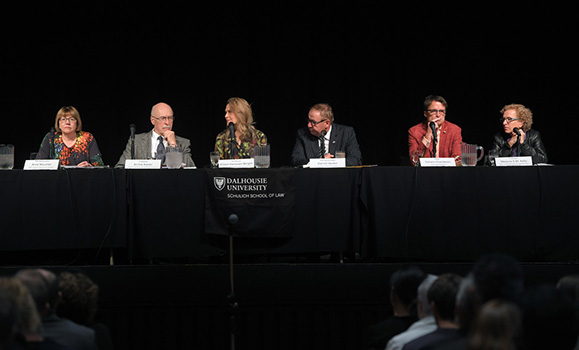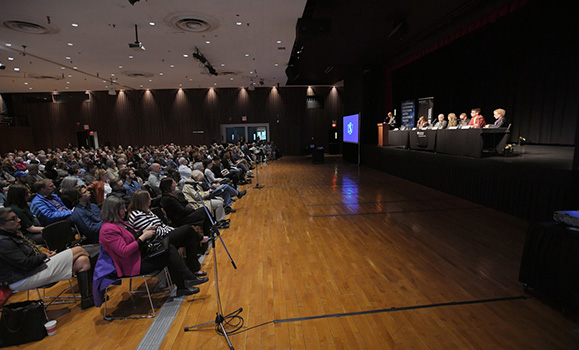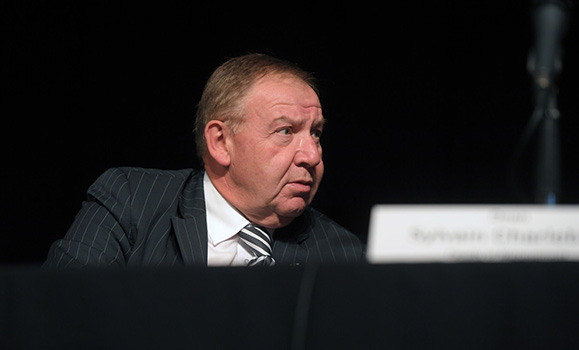For two hours on the evening of October 3, six panelists with expertise around the legalization of cannabis in Canada met an almost full house in the McInnes Room at DalтАЩs Student Union Building. They were there to discuss the complex issues legalization raises and answer pressing questions from audience members, who lined up at three microphones for almost an hour during the Q&A.
тАЬMarijuana: Is Canada Ready?тАЭ was offered in partnership with the Schulich School of Law, Genome Atlantic, DalтАЩs Faculty of Management and DalтАЩs Faculty of Arts and Social Sciences. Law school Dean Camille Cameron was the moderator, while the panel consisted of four Dal professors and two law school alumni:
- , chair of CanadaтАЩs Task Force on Cannabis Legalization and Regulation, ┬щ╢╣┤л├╜ Chancellor, and former Deputy Prime Minister of Canada
- , vice-chair, Global Public Affairs and former Premier of Nova Scotia
- Professor Sylvain Charlebois, dean, Faculty of Management and professor, Faculty of Agriculture
- , Department of Pharmacology
- Professor Archie Kaiser, Schulich School of Law and Department of Psychiatry
- , Departments of Pharmacology and Ophthalmology, Anesthesia, Pain Management and Perioperative Medicine

McLellan, who spoke first, took issue with the use of the word тАЬmarijuanaтАЭ in the eventтАЩs title. In her work on CanadaтАЩs Task Force on Cannabis Legalization and Regulation, she and her colleagues considered marijuana to be slang and chose instead to refer to cannabis in their documentation. тАЬLetтАЩs treat this plant with the respect that it deserves,тАЭ she said.
Responding to whether Canada is ready to legalize marijuana, which could be legislated as early as July 1, 2018, she said no, but added that nobody should be surprised or panicked at that. тАЬGovernment isnтАЩt ready right now, but is Canada getting ready? Yes,тАЭ she said. тАЬGovernment has introduced legislation, work is being done behind the scenes, regulation is being drafted and working groups are in place bearing down on the details.тАЭ
Watch:
"We are now a nation in recovery"
Prof. Kaiser stated that Canada was ready to implement the legalization of marijuana. тАЬIndeed, we were poised to make this choice almost 100 years ago, but instead we took the wasteful, damaging, reflexive and self-defeating path of prohibition and punishment,тАЭ he said. тАЬWe are now a nation in recoveryтАФlegally, constitutionally and morally, ready to take the wiser, fairer and ultimately safer direction of legalization.тАЭ
Over the years, Parliament, the courts and the police eagerly adopted the war metaphor тАЬthe war on drugs,тАЭ said Prof. Kaiser. Some of the effects of that war, he explained, are that prohibition has failed to reduce supply, demand and potency; enforcement has tended to unite users, addicts and organized crime; the public health dimensions of drug use have largely been ignored; and too many Canadians have been imprisoned and stigmatized.
тАЬThere is a role for criminal law in the aftermath of the legalization of marijuana,тАЭ said Kaiser, including ensuring that offenders of the newly configured law are penalized moderately and that possessors and small-scale growers are kept outside the grasp of the criminal law.

Dr. Denovan-Wright explained how cannabis affects brain function and said more research is needed to tell us about the risk of developing addiction. тАЬThere is untapped medical potential with cannabis as well as potential harm,тАЭ she cautioned.
Dr. Kelly pointed to the huge body of research supporting the therapeutic use of cannabis, which currently isnтАЩt an approved drug in Canada. тАЬWe need more research and education for patients and health-care providers,тАЭ she said, adding that we also need more user-friendly options besides smoking and edibles.
Dal survey cites CanadiansтАЩ support
Dr. Charlebois referenced a recent survey report he co-authored that revealed a healthy majority of Canadians support the legalization of recreational pot use but have concerns about childrenтАЩs access to edible products containing cannabis. In fact, about 68 per cent of Canadians favour the legalization of non-medicinal marijuana, with the bulk of that support in British Columbia and Ontario.
тАЬPeople are willing to accept the legalization of non-medicinal marijuana, but at the same time they recognize societal risks related to doing so,тАЭ said Dr. Charlebois. тАЬAs a society, we need to do our job to make sure we legislate and regulate the right way.тАЭ

Dexter, who discussed the legislation and regulatory processes, examined the challenges that legalization will pose, including supply medical and retail gaps, marketing and branding restrictions, price (including taxation), employee training, consumer experience and preparing for the edibles market. тАЬThereтАЩs plenty of work to do between now and July 1,тАЭ he said.
McLellan mentioned that Canada is the only member country of the (OECD) to legalize cannabis.
тАЬThe world is watching us,тАЭ she said. тАЬWill we learn from others? Yes. Will there be surprises down the road? Yes. ThereтАЩs a lot of work being done at both the federal and provincial levels to get ready, but Canada is getting ready.тАЭ

